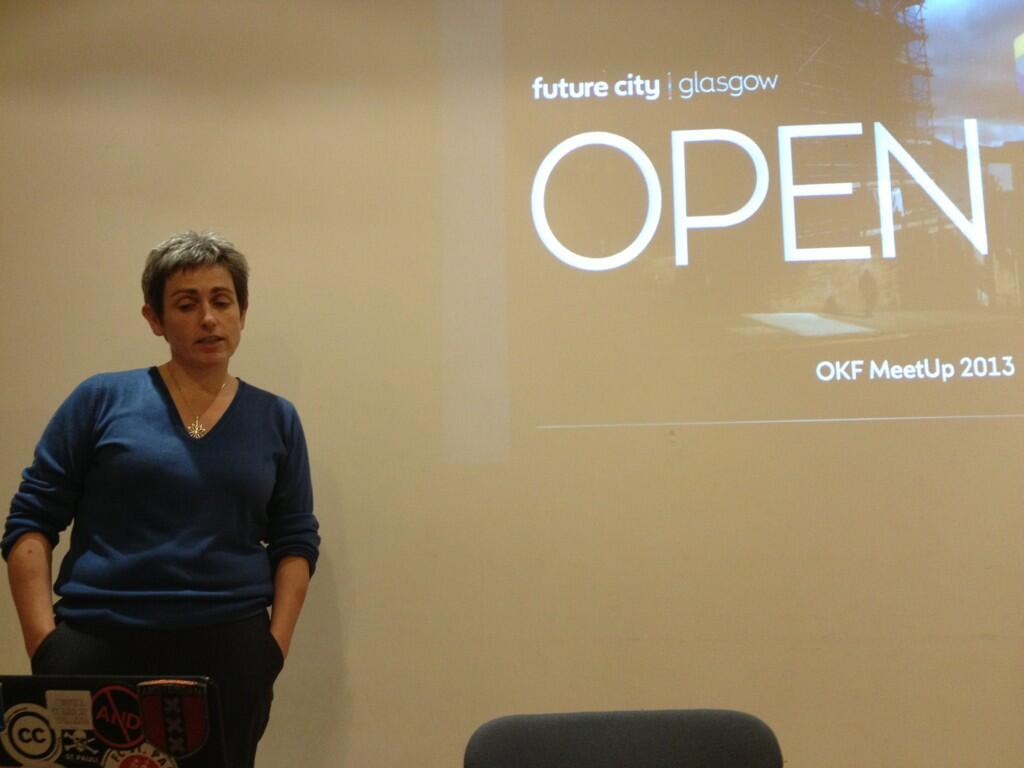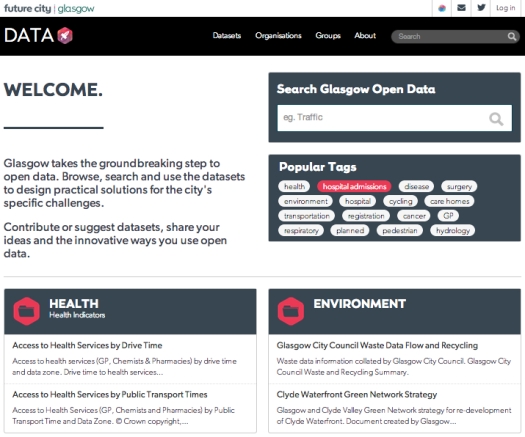Last night I went along to the second Open Knowledge Foundation Glasgow meetup. The event took place in the Board Room of the CCA, which was rather more spacious than the Electron Club that kindly accommodated us last time. We all got to sit on chairs rather than perch on tables, which made tweeting much easier! Once again we had a wide range of fascinating lightning talks which generated a great deal of lively discussion. I’ve posted a storify of the event here: open-knowledge-foundation-glasgow-2
Open Scotland – Lorna M Campbell, Cetis
I had the pleasure of opening the meeting with a short talk about the Open Scotland initiative, led by Cetis, SQA, the Jisc RSC Scotland and the ALT Scotland SIG, which aims to raise awareness of open education and explore the potential of open policy and practice to benefit all sectors of Scottish education. The initiative hopes to build on existing open education developments to encourage the sharing of open educational resources and to embed open educational practice across Scottish education. The Open Scotland blog provides a focal point to engage the community in discussion and debate, disseminate news and developments relating to all aspects of openness in education and to further the actions and deliverables discussed at the Open Scotland Summit held in Edinburgh in June.
 Open Badges: What? How? Why? – Grainne Hamilton, Jisc RSC Scotland
Open Badges: What? How? Why? – Grainne Hamilton, Jisc RSC Scotland
Grainne introduced the concept of open badges and outlined the work of the Open Badges in Scottish Education Group. Open badges are data infused images that provide an online representation of skills earned. Badges could provide an important link between informal and formal learning as they enable users to gain recognition for learning that happens anywhere. The Open Badges in Scottish Education Group, which is supported by Jisc RSC Scotland, has set up three sub-groups focusing on Learner Progress, Technology and Design and Staff Development.
 Wikimedia UK: Scottish Women on Wikimedia – Graeme Arnott
Wikimedia UK: Scottish Women on Wikimedia – Graeme Arnott
Only 15% of Wikipedia editors are women, so Wikmedia UK is taking positive steps to address the gender imbalance of editors and remove sexism and racism from posts. Graeme spoke about a Wikimedia UK editathon run in conjunction with Glasgow Women’s Library. The event hoped to expose the hidden history of women in Glasgow and provide a way for more women from the Library to engage wth technology.
 The Digital Commonwealth: digital storytelling and social media archiving – Jennifer Jones
The Digital Commonwealth: digital storytelling and social media archiving – Jennifer Jones
Jennifer introduced the Lottery funded Digital Common Wealth project which aims to support creative community expression in response to the Commonwealth Games. Digital Common Wealth has three strands: Community Media Clusters, Schools Programme and Creative Voices at UWS. Developing digital literacies and creating and sharing data are key principals for Digital Common Wealth. Stories shared by social media are rich source of data and Digital Common Wealth are working with the National Library of Scotland to archive the project’s outputs.
 Future Cities Glasgow – Pippa Gardner
Future Cities Glasgow – Pippa Gardner
Pippa provided an update on the £24 million Glasgow Future Cities Demonstrator project. Last night the project’s Data Portal had 99 data sets, however this morning they tweeted that they had just added their 100th data set from the Celtic Connections Festival. The project used the Open Data Handbook to prioritise themes, however some of their data sets are more open than others, depending on their original licences. Where possible Glasgow will make data open by default. Engagement hubs and links to digital inclusion initiatives are part of the project’s approach and the team will also be running hackathons in the new year.
 Open Architecture – Duncan Bain
Open Architecture – Duncan Bain
Duncan highlighted some very interesting approaches to open architecture including Wikihouse, which aims to democratise the process of construction, Terrafab which allows you to download and print 3D models of Norwegian terrain maps, and Terrainator, a similar UK based on OS open data. Duncan’s talk provoked a fascinating debate on lack of openness in architecture education practice, and why architecture has not embraced openness in a similar way that software development has.
 Open Street Map – Bob Kerr
Open Street Map – Bob Kerr
Presented an impromptu overview of the very cool work of the Open Street Map initiative and pointed us to the LearnOSM step by step guide. Bob highlighted some amazing examples of open street mapping at work, including the humanitarian effort to map Haiti after the earthquake and Map Kibera, a project that mapped the Kenyan shanty town of Kibera revealing the extent of the community and bringing it to life. Bob’s talk generated a really interesting discussion on the political and social importance of maps. Duncan pointed out that traditionally the people who have the power have the maps, however initiatives like Open Street Map is changing that.
This meeting was organised by Graham Steel, Graeme Arnott and Ewan Klein with a little input from Sheila MacNeil and I. The event was streamed by Jennifer Jones.

